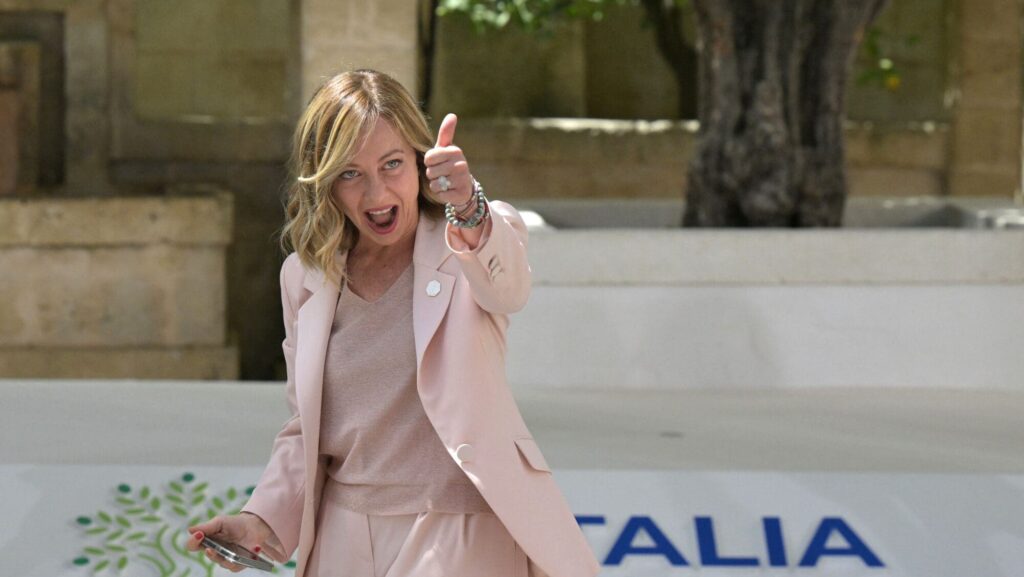
Italy’s PM Giorgia Meloni jokes with photographers at the G7 Summit
Tiziana FABI / AFP
The timing of this year’s G7 Summit, starting on Thursday, June 13th, could not have been better for the host, Italy’s conservative prime minister Giorgia Meloni. Her major victory in last week’s EU elections seems even more pronounced when compared to the crushing blows that some of her distinguished guests suffered.
Indeed, as others also observed, this year’s G7 is about Meloni and “six lame ducks.” It is not only Germany’s Olaf Scholz and France’s Emmanuel Macron whose political positions are precarious. British PM Rishi Sunak is likely heading into one of the worst electoral defeats of his Tory party’s history in a few weeks, Canadian PM Justin Trudeau thinks about quitting “daily,” Japan’s Fumio Kishida is grappling with record-low approval ratings, and U.S. President Joe Biden’s son, Hunter, has just been found guilty of violating federal gun laws just months before this year’s presidential election. Commission President Ursula von der Leyen, representing the EU at the Summit, is in a similarly shaky position, having much less chance for re-election due to her coalition’s reduced numbers in Brussels.
Whether they like it or not, as the head of the only stable major European government, Meloni is now the de facto leader of Europe (and maybe even the West), which makes the 50th G7 Summit look like a queen holding court among her vassals.
The grandeur of this meeting—organized in Brindisi, southern Italy—is also appropriate. Besides the leaders representing the regular members of the G7 (Germany, France, UK, Italy, Japan, Canada, the U.S., and the EU), 13 other states have also been invited, including leaders of Brazil, Argentina, India, Egypt, Turkey, Saudi Arabia, Ukraine, the chairman of the African Union, and even Pope Francis for the first time in history. By the guest list, one would think it is a BRICS and friends meeting, but that’s part of the rationale as the West tries to prevent the third world from falling into China and Russia’s hands.
According to media reports, ten thousand personnel will guarantee the safety of the attendees, as well as 24-hour air surveillance from an army of drones and spy planes, and even so-called robot pigeons that are used in St. Peter’s Square.
The Mediterranean-focused U.S. 6th Fleet, headquartered in Naples, will guarantee naval security. One of the warships had been selected to house Ukrainian President Volodymir Zelensky, with the idea that Russia wouldn’t dare to strike a NATO military asset. The rest of the high-level guests will sleep in the resort’s 29 luxury villas rented for the event.
There are six working sessions outlined in the three-day summit’s ambitious program. These include Africa, the Middle East, Ukraine, the climate, migration, as well as a shared one on energy and artificial intelligence. The G7 members are trying to find new soft power avenues with the Middle Eastern and African countries, while the part about Ukraine will focus on preparing a unified position for the upcoming peace conference in Switzerland (for which Russia has not even been invited.)
A sign that Meloni will take the initiative in most of these discussions, flaunting the upper hand the EU election results gave her, can also be seen in the way she’s inserting her trademark pro-family approach in the draft resolution already by blocking a reference about the G7’s global support for “safe and legal abortion.”
The second and less official objective of the summit will be to begin preliminary negotiations about reshuffling the top positions of the EU institutions, including the heads of the European Commission, the European Council (EUCO), the European Central Bank (ECB), and the bloc’s high representative for foreign affairs.
These talks, however, will not be easy. Traditionally, the EU is represented at the G7 by both presidents of the bloc, Commission President Ursula von der Leyen and EU Council President Charle Michel. As we wrote before, the two have a problematic relationship, to say the least, and neither can be considered an impartial arbiter as both stand in line for re-election (von der Leyen) or a new job (Michel).
No decision will be taken without the rest of the EU countries, of course, as this meeting will only serve as a means to gauge the intentions and dynamics between the largest EU states. What’s certain is that the Joker is in Meloni’s hands, as neither Macron nor Scholz are in a strong negotiating position right now, unsure of holding onto their posts for long. Meloni will preside as a true kingmaker, knowing that no one will be EU Commission president without her approval.
